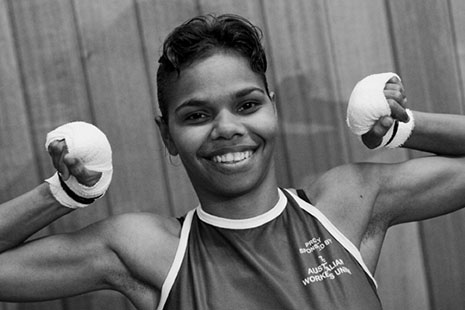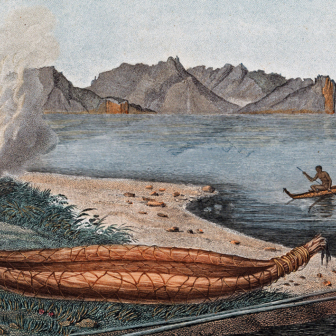THE ANNUAL festival of Indigenous films, Message Sticks, is now ten years old. It’s a short, free program, asking for one Saturday out of your life and two evenings of screenings – three if you want to pay up, frock up and attend the opening night party – in the Playhouse of Sydney Opera House, a hall which people grumble about a lot when it’s used for live performance, but which functions superbly as a cinema. There are active discussion intervals outside on the boardwalk; the views down there are rather nice too.
Last year Message Sticks gave us the premiere of Samson and Delilah among much else, and Ivan Sen’s splendid Fire Talker, on Charles Perkins’s life and work. If this year’s program doesn’t match those for headlines, it continues not only to widen our vision of our own world, but also to build connections across it. The Q & A sessions are not like those with big-name directors at mainstream festivals; they’re more confident, more involved; it’s an active, fully engaged, black and white audience. The co-curators, Darren Dale and Rachel Perkins, say that the annual assembly makes “a family of sorts,” and in this fractured society that’s worth having.
For the consumers of mainstream media and the standard victimologies, Adrian Wills’s hour-long documentary Boxing for Palm Island offers something utterly unexpected. Although there’s a spoken memory of police violence and the death of Cameron Doomadgee, the focus is not on crime, poverty and anomie, but on a community’s resolve to throw off the stereotypes, transcend a terrible history, and keep on making a believable life in their own place. An elderly white trainer, Uncle Ray Dennis, is on Palm to get a boxing team together and organise a career for an unlikely champion. Noby Clay is a featherweight (forty-five kilos) twenty-seven-year-old mother of three, and still breastfeeding the youngest. She is seen training and performing as fiercely as a dancer – this movie was the first time I’ve ever perceived boxing as a beautiful activity. By virtue of technique, cunning and hellbent motivation, Noby wins against several rather larger opponents, enjoys herself hugely, and goes on doing so when she, Uncle Ray and others of their cohort face the audience for the Q & A. She tells us all that she really, seriously wants to become famous, and she’s highly likely to make it.
Noby carries unforced symbolism; the film is about her, but it’s also about Palm Island. Uncle Ray takes the team on tour to boxing events in Canberra and Geelong; they get a sightseeing trip into Melbourne. Looking out on the city from a tall office building, Noby says, “I’d rather be on Palm.” That statement takes on great force when you think about the island’s history as a gulag, a place where over the past century Aboriginal people, forcibly assembled from many language groups, were never living by choice; where they were regimented, jailed for no greater offence than failing to salute a white person, allegedly talking out of turn. Claiming the place as home, Noby is part of a mixed community of valiant people who have determinedly worked to redeem it. Behind the story, rarely spoken, there is Australia’s deep north/south divide. Reading Chloe Hooper’s The Tall Man, we can see the high courage in Boxing for Palm Island; both in the people shown, and in the project of the film itself.
Message Sticks includes short fictions from the United States, Canada and New Zealand, films that confirm the affinities; in those countries too, young indigenous people are caught between old and new worlds, and the business of storytelling is often, centrally, about refusing prescribed roles and turning history upside down. The most haunting of these is Katie Wolfe’s Redemption, a seventeen-minute poem set on a bleak hillside in Taranaki, with a very young Maori couple retreating into a drugged-out erotic dream. That film, like Adrian Wills’s dark vignette, Daniel’s 21st, is an act of mourning. Some of the films in such a program are about loss; others work to transcend it, but this audience doesn’t expect to be let off too lightly.
Other films on the program reach across the racial divide. Michael Longbottom’s Big Fella tracks an Aboriginal man’s battle with extreme obesity, illness and depression; he won, but it was a long business, and nobody can do it alone. The affirmation of hope, the audience’s constant desire, will only come at a cost. For some, it was clear that Genevieve Grieves’s Lani’s Story was the toughest hour on the program. Lani faces the camera to tell a particularly horrific and drawn-out story of the murderous domestic violence in her first marriage; she only just managed to get out alive. Then there was the really hard part, summoning the resources, years afterwards, to take the story to court and secure justice; and in that story too, a big part of the message is that you can’t do it alone. In the Q & A on the platform, Lani’s second husband, John, emerged as a modest, reluctant hero. What made everything harder for them was the filming itself; the process took everything further, drove the story past its own boundary.
WITH THAT kind of commitment to truth, films have been known to make a difference. The force of Philippe Lioret’s unflinching Welcome, the most important item from the French Film Festival, has been enough in France to induce a change in a repressive law that forbade the citizens of Calais to help the refugees who crowd the docks, trying for clandestine passage to Britain. No soup or blankets, in other words. Welcome tells one such asylum seeker’s story. At the same time, it’s the story of a difficult ethical change of mind; thematically, a little like The Lives of Others. It’s still playing on suburban circuits; catch it if you can. The prime minister, and everyone else concerned with refugees and asylum-seeking, should be chained in their seats in front of it.
Next month Message Sticks will tour the state capitals, Canberra, Darwin, Townsville, Cairns and Broome, and at least some of the films will get television airings. In the meantime, The White Ribbon, Beneath Hill 60 and Soul Kitchen are all worth seeing; I will discuss them soon in this space. •





